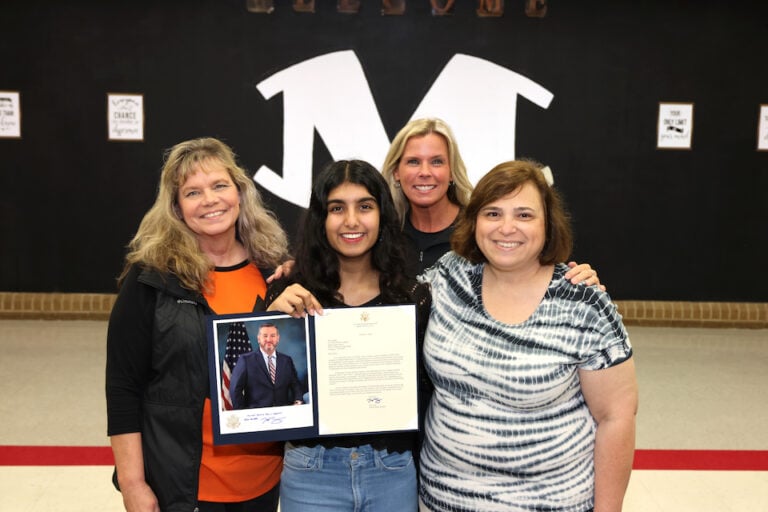
Maya Shah recognized by Sen. Ted Cruz
Maya Shah is proof that a high schooler can change the world.
That’s why she got a letter from Texas Senator Ted Cruz last week.
SURPRISE
No one at Martin High School’s STEM Academy is really surprised that senior Maya Shah got a letter of congratulations from Sen. Cruz. After all, they’ve known Shah for nearly four years and seen the kind of student and person she is. And they’re familiar with her groundbreaking research on preventing gun violence.
But Shah got a surprise last week when Martin principal Malene Roddy called her to a school staff meeting. Shah walked in to see her parents there, too, along with her counselors. That’s when Roddy presented Cruz’s letter to Shah.
“She’s done a lot of work and it’s really impressive,” Roddy said. “Our staff was like, ‘Whoa! Who is that person?!’”
That person won second place in the Science for Development Award category at the 2024 Regeneron International Science and Engineering Fair in Los Angeles last May. It was for her research examining the psychology of gun violence in an effort to prevent it.
While Shah believes her research is worthwhile if it helps even just one person, Cruz recognized that it has the potential to impact the world.
“As you continue your studies and engage in research that could one day be critical to the lives of Texans and Americans, I wish you every success,” Cruz wrote. “I look forward to celebrating more of your achievements as you work to turn your questions into action for the benefit of our world and our Great Nation.”
THE RESEARCH
COVID-19 spurred Shah’s interest in scientific research when she was still just a freshman in high school. She conducted a research project into the effectiveness of masks for preventing COVID that earned her first place at the state science fair in the translational mediation sciences category.
The experience made her want to do more, and she asked her local regional fair coordinator for a research mentor. That’s when she got paired with UT Arlington psychology professor Dr. Amandeep Dhaliwal and started her now years-long and ongoing research into gun violence prevention.
“I’ve been looking at the traits of individuals who are predisposed for gun violence in hopes of understanding them and maybe lowering them,” Shah said. “I hope to find an apolitical solution to something that has become an epidemic of violence.”
Shah’s first year of research – as a 10th grader – focused on psychopathy – one of the predisposing traits for gun violence – and its relation to intellectual humility.
“It’s [intellectual humility] basically the idea of respecting and appreciating others’ beliefs and being able to change your mind, which I think we need more of nowadays,” Shah said.
Shah collected data through surveys and then got a lot of help from Martin AP statistics teacher Danielli Warner in learning how to interpret the data.
“I would just go to her classroom during lunch, and she would take the time to explain to me every single number, any question that I asked,” Shah said. “She was so incredibly helpful. She was an amazing mentor.”
The data unlocked an unexpected conclusion.
“I found that there is actually a significant relationship between psychopathy and some of the subsets of intellectual humility, specifically changing one’s viewpoints based on others’ viewpoints and respecting other’s viewpoints,” Shah said. “So that means psychopaths, those who are predisposed toward gun violence, can change their mind.”
During her junior year, Shah continued to study psychopathy but added a second key indicator of gun violence: childhood trauma.
“First, I found that there is an overlap between these two traits,” Shah explained. “So, there are individuals who are not only traumatized but also psychopathic, and those are the people that I’m trying to reach because that overlap is that most predisposed group.”
Shah was able to use the data to determine the relationship of psychopathy and childhood trauma with intellectual humility.
“The crux of my research is I found that intellectual humility lowers psychopathy levels in traumatized individuals,” Shah said. “So, I theorized if you grow intellectual humility in a population, you could lower psychopathy in traumatized individuals.”
And that means you lower the risk of gun violence.
STILL GOING
Shah isn’t done. She submitted her project for publication, and now she’s continuing her research, even looking at data that she’ll collect from a new course at Martin this semester called “Methods for Academic and Personal Success.”
“I hope to gain a proof of concept of my research because I hope to move the needle,” Shah said. “Because if I can stop one school shooting, I’m saving that many lives.”
As Shah looks ahead to college next year, she credits the STEM Academy with launching her journey.
“The STEM Academy was just so incredible in helping support me and allowing me to go and giving me the resources I needed to compete in this amazing fair [in L.A.],” she said.
Shah plans to continue her research in college while she pursues medicine.
“I can’t believe I’ve been able to make an impact through science,” Shah said.
But at this point, everyone else at Martin can believe it because they’ve witnessed it for the last four years. And they all look forward to the impact she’ll make in the future.
